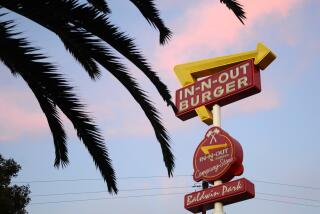Love Fat-Laden Foods? It’s Only Human
- Share via
WASHINGTON — You know too much fat is bad for you, but there’s something irresistible about a charcoal-broiled steak.
Potato chips, french fries, ice cream, butter sauce--why is fat so hard to avoid? Why do food processors load their products with it?
Because, no matter what your head tells you, your nose, mouth and stomach love fat, experts say.
Even those with the most official of intentions may end up making excuses for people who relish fatty foods.
Last month, for example, the consumer lobby Public Voice for Food and Health Policy blamed the federal government for requiring butter, ice cream and cheese to contain high amounts of fat.
The same day, the Journal of the American Medical Assn. reported that only 2% of us would live longer if everyone limited their fat consumption to the recommended 30% of one’s diet.
The New England Journal of Medicine put the icing on the cake the next day, by saying that weight-loss diets can be dangerous to people who tend to regain the weight rapidly.
In a society that has more food than it needs, the sensual pleasures of eating begin to dominate. And flavor, mouth feel and satiety all are enhanced by fat content.
“Fat holds taste on the tongue longer,” said Keith Keogh, executive chef at Walt Disney World’s EPCOT Center. And the aroma. Think of what you feel when you smell meat cooking on an outdoor grill, he said.
“Fat has a rich, velvety texture in the mouth,” said Mial Parker, instructor at the California Culinary Academy in San Francisco.
“Fat makes you feel full,” said Katherine Woteki, head of the Food and Nutrition Board at the National Academy of Sciences. “There is something about fat that we find pleasant, and we seek out what is pleasant.”
Yet it is a pleasure, she said, that can be satisfied by other foods or smaller quantities of fat.
Keogh, who manages the team of U.S. chefs who will compete in the 1992 Culinary Olympics in Frankfurt, Germany, said the professional cook’s greatest challenge is to keep fat to a minimum without sacrificing flavor.
Less fat and more herbs, vinegars, wines and seasonings are being used by the U.S. team, which emphasizes low-fat cuisine in the competition.
“Most flavor components for all foods are in the fat,” said Dr. Gary Smith, Colorado State University animal sciences professor.
Smith, who does research for the meat industry, said there would be very little flavor in meat if had no fat. He said the fat also protects meat from overcooking.
If you like meat rare or medium-rare, leaner cuts are fine, but for medium to well-done, fat marbling allows meat to be cooked longer without losing flavor, said Smith.
Animal fats and tropical oils--known as saturated fat--have been found to raise blood cholesterol to levels that can lead to heart disease.
Professional cooks say there is no substitute for animal fat, however, when it comes to frying.
“Cereals that stay crisp with milk in the bowl longest have the most saturated fat,” said Keogh.
Dale Huffman, professor of meat science at Auburn University, said one of the stumbling blocks to reducing the fat in ground beef is loss of flavor.
It was Huffman who developed the low-fat McLean burger for McDonald’s. It contains a seaweed derivative, carrageenan, to help retain moisture during cooking. He said that flavor enhancers are needed when fat is removed.
He said fat also contains fatty acids that are critical to human nutrition.
But there’s hope.
Huffman said people who get used to a low-fat diet develop a distaste for the coating of fat that a typical burger leaves in the mouth.
More to Read
Eat your way across L.A.
Get our weekly Tasting Notes newsletter for reviews, news and more.
You may occasionally receive promotional content from the Los Angeles Times.










